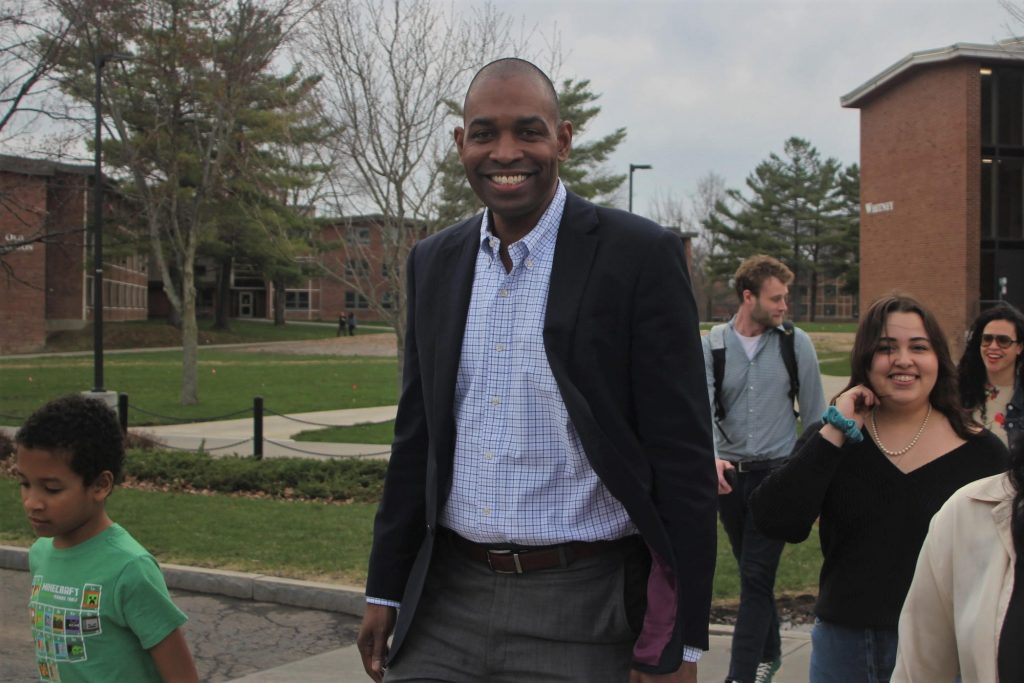While on his tour of New York state’s 19th Congressional District (NY-19), U.S. Rep. Antonio Delgado (D-NY) stopped at Binghamton University for a Q&A hosted by the BU College Democrats.
The event, held on Wednesday, was broken into two segments. The first hour was dedicated to mingling, a voter registration session by the New York Public Interest Research Group (NYPIRG) and music and free food as students funneled into the Chenango Champlain Collegiate Center Multipurpose Room, and the second hour saw the Q&A session with Delgado.
According to Delgado, the 2016 election was what made him get into politics, after six years at a law firm. Delgado was installed as the NY-19 representative for the first time in 2019, making him the first African American or Hispanic person to be elected as a representative of upstate New York.
The first question Delgado answered had asked which of the 18 bills he passed so far was his favorite. Delgado said his first bill, the Family Farmer Relief Act, holds special importance to him, as it directly catered to much of his constituent base.
“It raised the debt limit for farmers filing for bankruptcy, allowing them to be able to refinance safely,” Delgado said. “Another favorite is my newest sign-off, the American Relief Act Plan, which will give every single town, county and village the ability to get direct funding, which will be discretionary and given regardless of population size. This is the power of direct democracy.”
Delgado was then questioned on his plans to introduce and encourage affordable public education. He started by mentioning how low Pell Grant funding had gotten while interest rates have risen freely.
“Public schooling has been devalued and students are literally being saddled with debt, it’s a burden,” said Delgado. “I introduced a bill that will level up Pell Grant funding close to where it used to be when it paid for 70 percent of schooling. There’s also the Gateway to Careers Act, which funds the partnership between universities and social service programs like housing, career pathing and child care. This will stop punishing people who didn’t have the chance to do school all at once or who already have a job and children. I support a lot of legislation that deals with loan forgiveness as well.”
In regard to his stance on health care, Delgado described the Medicare-X Choice Act, a bill he said he is in full support of because of its effect on the national market.
“In short, it’s a public option,” Delgado said. “It allows anybody to opt into a nonprofit-based system, giving seniors other options outside of Medicare and allowing small businesses the chance to offer good benefits without having to pay out of pocket for it. This program gives Medicare, and therein taxpayers, their negotiating power again. The nonprofit aspect adds competition to the market, so those who’d like to stick to their old insurance will also experience lower deductibles as the company tries to fight for its top spot. Not having universal health care has turned much of the [United States] into a money-hungry power system.”
Jasmine Orgo, a sophomore majoring in biology, said she attended the conference because she wanted to ask Delgado for advice on becoming a better advocate.
“I’m here because I’m trying to secure an internship with his office,” Orgo said. “He’s been making tremendous progress so far with the amount of bills he’s been able to pass, especially as a person of color in a predominantly white district. Any advice he has for law school or entering the political scene is appreciated.”
Delgado gave advice for college students who are interested in entering the political scene.
“Do your homework,” Delgado said. “I mean that both literally and figuratively. A lot of times, we have people who get into politics but they aren’t anchored in it. They don’t have anything they really believe in. They may say they’re a Democrat or Republican, but those are just flags they wave to say they’ve joined a team. Search within yourself for what you are passionate about and choose to fight for it. It requires sacrifice and if it doesn’t, you’re doing it wrong.”
Maxwell Foster, an undeclared sophomore, said the event caused him to reflect on the realities of politics and his future career.
“It really isn’t as black and white as I thought it was,” Foster said. “Law school always seemed like a straight shot for me but [Delgado’s] wife’s point about how it is more than memorization really hit home. She said we have to have a reason to go to law school because if I don’t, I may wind up with loads of debt and a degree I don’t know what to do with. It won’t be as easy as undergrad, so I’ll definitely have to do some soul-searching before I graduate.”



